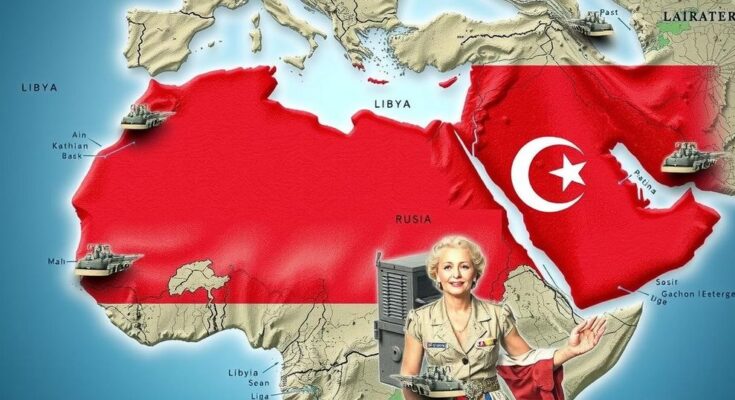Russia is shifting its strategic focus from Syria to Libya after the decline of Bashar al-Assad’s power. By supporting Khalifa Haftar in Libya, Moscow aims to maintain and expand its influence in Africa while facing new challenges from competing regional powers. Russian military resources are being redirected to Libya, marking a significant transition in the Kremlin’s geopolitical strategy in response to changing dynamics in the Middle East and North Africa.
Following the waning influence of Russian ally Bashar al-Assad in Syria, analysts assert that the Kremlin is shifting its focus towards Libya as a strategic alternative. Historically, Russia has operated military installations in Syria to enhance its capacity in the Mediterranean and Africa; however, this situation has become perilous due to the evolving political landscape. New Syrian President Ahmed al-Sharaa has expressed a desire for Russia to maintain its presence, yet the shifting power dynamic has prompted Russia to reevaluate its strategic options in the region.
In Libya, Russian mercenaries are already backing Field Marshal Khalifa Haftar, who leads the eastern faction of the country against the Tripoli-based Government of National Unity (GNU), recognized by the United Nations and backed by Turkey. Experts highlight that this shift represents an effort for Russia to sustain its African missions while mitigating its declining influence in Syria. Recent intelligence reports indicate that as many as 1,800 Russian troops were present in Libya by May 2024, as Russian military resources have been redirected from Syria to multiple locations in Libya, including the influential port of Tobruk.
This logistical expansion is underscored by ongoing concerns that these maneuvers could disrupt Western interests in the region, particularly as Haftar could serve as a tool for Moscow to leverage its influence. However, the environment in Libya poses distinct challenges not present in Syria, as global powers such as Turkey, Egypt, and the United Arab Emirates are also involved, complicating Russia’s operations and limiting its actions.
The background of the article revolves around the geopolitical transitions following the political changes in Syria, particularly the declining authority of President Bashar al-Assad. Historically, Russia has maintained military footholds in Syria to project its power in the Mediterranean and to engage with African nations. The emergence of a new leadership in Syria has led Russia to reconsider its engagement strategy, turning its eyes toward Libya, where it seeks to establish a reliable ally in the form of Khalifa Haftar amidst a complex political landscape entangled with various international interests.
In summary, Russia’s pivot to Libya highlights its efforts to sustain its influence in Africa and counterbalance its weakening position in Syria. The involvement of Russian mercenaries with Khalifa Haftar underscores Moscow’s strategic interests in the region, but the presence of competing powers combined with Libya’s intricate political landscape could pose significant obstacles. Going forward, the Kremlin will need to navigate these challenges carefully while ensuring it does not repeat the past errors observed in Syria.
Original Source: www.france24.com




